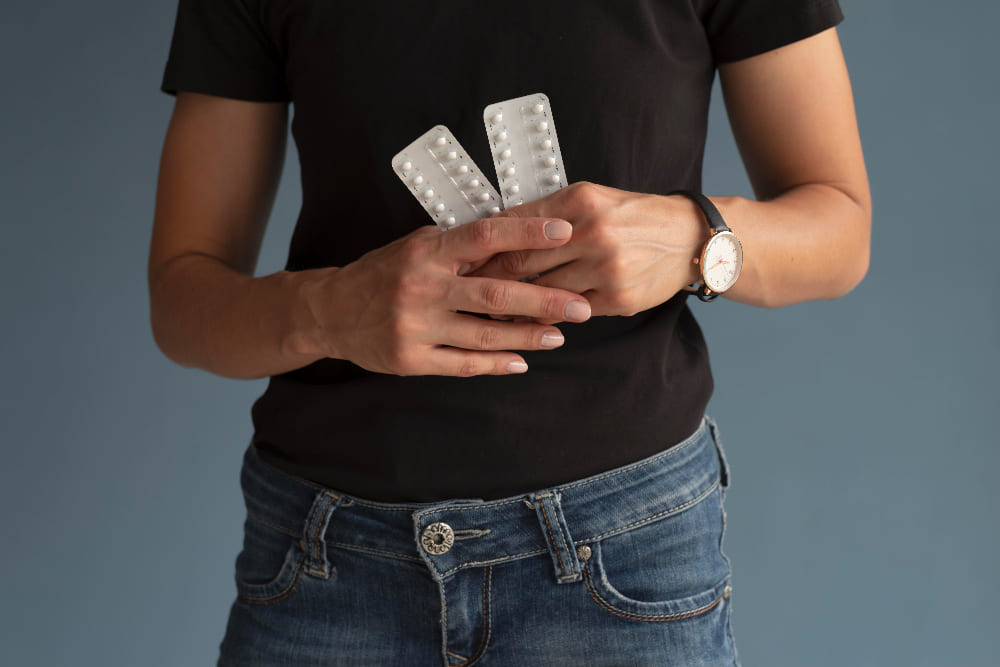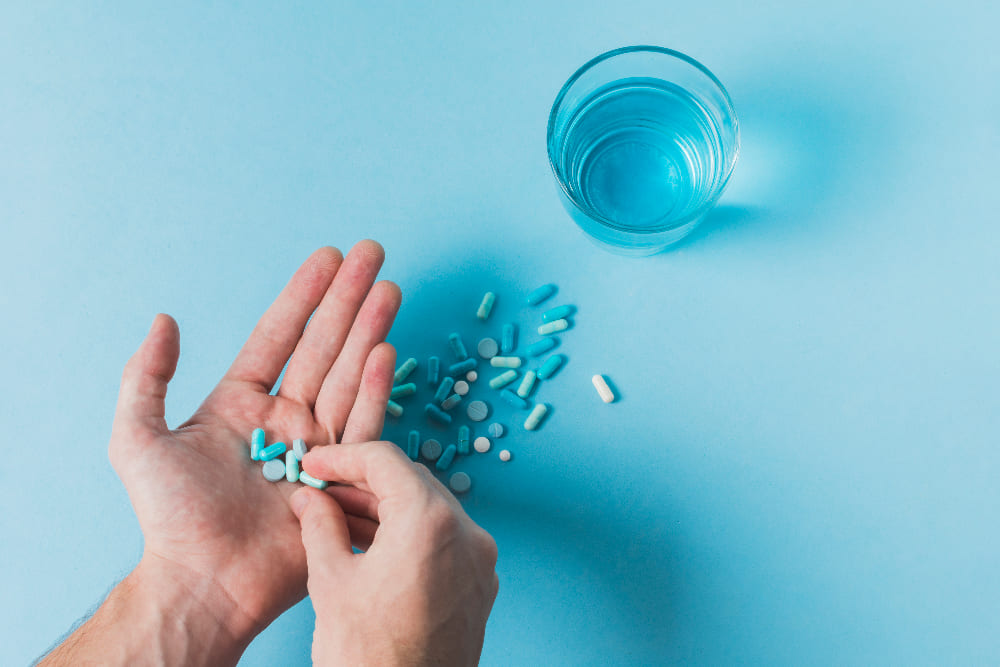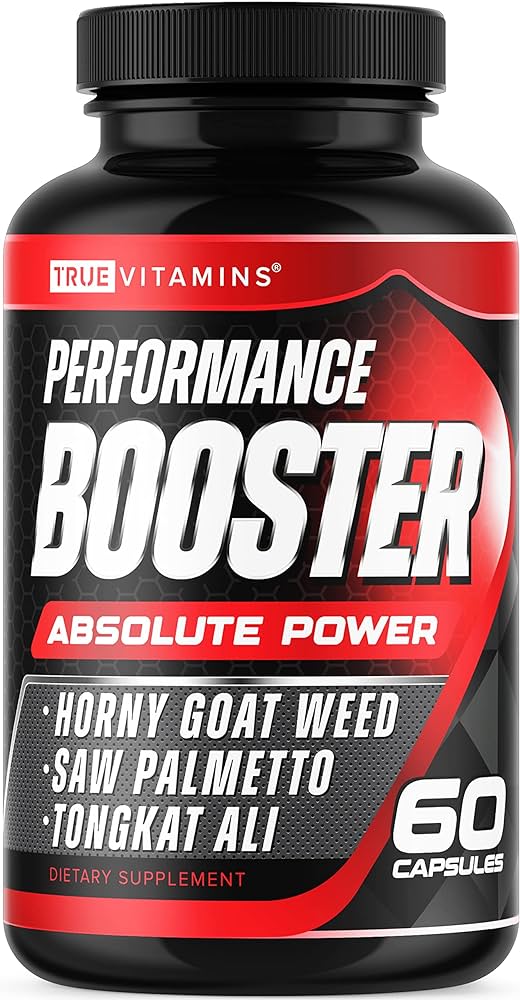Bupropion Erectile Dysfunction: Causes & Solutions

Up to 75% of people on antidepressants face sexual problems. Bupropion, used for depression and quitting smoking, seems safer. But, it can still cause bupropion erectile dysfunction, affecting those who need mental health help.
Bupropion might boost sexual desire and activity in some studies. But, it’s important to see its full picture. The bupropion ED treatment issue comes up when users face impotence. This leads to talks about its side effects and the need for personalized care.
As more people look for help, it’s key to understand bupropion sexual dysfunction and its effects.
Table of Contents
Understanding Bupropion and Its Uses

Bupropion, also known as Wellbutrin and Zyban, is an atypical antidepressant. It works differently than most antidepressants by blocking the reabsorption of norepinephrine and dopamine. This makes it a popular choice for improving mood and brain function.
What is Bupropion?
Bupropion focuses on neurotransmitters that help control mood. It’s effective in treating depression and helping people quit smoking. It’s also known for having fewer side effects on sex compared to other antidepressants.
Studies show that taking 150 mg of bupropion daily can even help improve sexual function. This is a big plus for those who struggle with depression and sexual issues.
How Bupropion Affects Mental Health
The link between bupropion and mental health is crucial for many. Depression often leads to sexual problems, affecting up to 60% of people. Bupropion helps reduce these symptoms, improving both mental and sexual health.
Its minimal side effects make bupropion a standout among psychiatric drugs. This encourages more open discussions about its role in treatment.
| Medication Type | Impact on Sexual Function | Common Side Effects |
|---|---|---|
| Wellbutrin (Bupropion) | Mild sexual dysfunction | Minimal side effects |
| SSRIs (e.g., Sertraline) | Severe sexual dysfunction | Varied, including nausea, insomnia |
| TCA (e.g., Amitriptyline) | Severe sexual dysfunction | Weight gain, drowsiness |
Causes of Erectile Dysfunction Related to Bupropion
Bupropion, an atypical antidepressant, can affect sexual health in different ways. It’s important to understand the bupropion erectile dysfunction causes to address sexual function impacts. Bupropion changes neurotransmitters in the brain, like dopamine and norepinephrine. These are key for sexual arousal and keeping an erection.
Mechanisms of Action in the Body
Bupropion works by changing neurotransmitters in the body. It affects dopamine and norepinephrine, which are important for mood and energy. This can indirectly affect sexual function, leading to erectile dysfunction in some.
Impact on Neurotransmitters
Neurotransmitter balance is crucial for sexual health. Bupropion can cause both positive and negative effects on sexual function. While some studies show it may improve sex, it can also cause problems for others. It’s important to watch for any changes in sexual health while taking the medication.
Other Factors Contributing to ED
Other factors can also cause erectile dysfunction, besides bupropion. Health issues like anxiety and depression, and the effects of other medications or lifestyle choices can make it worse. This shows the need for a full evaluation to find the best treatment. For more information on treatments and lifestyle changes, check out this resource.
How to Diagnose Bupropion-Induced Erectile Dysfunction
To diagnose erectile dysfunction caused by bupropion, a detailed approach is needed. This starts with a deep look into the patient’s medical history. It’s important to know about any past health issues and medications taken.
Medical History Evaluation
Healthcare providers will ask many questions during the first check-up. They want to know:
- What treatments for depression or mental health have been tried before
- If there were any sexual problems before starting bupropion
- What other medicines are being taken that could affect sex
- If there are any health issues like heart disease or diabetes that could cause erectile problems
Physical Examination Procedures
A physical exam is key in finding out if bupropion is causing ED. The exam will look at:
- The genitals for any unusual signs
- The overall health, looking for signs of erectile dysfunction
- The blood pressure and heart health, as these can affect sex
Laboratory Tests and Assessments
More tests are done to check for other reasons of erectile dysfunction. These tests might include:
- Tests to see if hormone levels, like testosterone, are okay
- Metabolic tests to check how the body is working
- Urinalysis to find any hidden health issues
By using these methods, doctors can understand the situation better. This helps in finding the right treatment for the patient.

Common Symptoms of Erectile Dysfunction
Erectile dysfunction (ED) can affect a person’s sex life and overall health. It includes physical and emotional challenges. Knowing the sexual side effects of bupropion is key to understanding erectile issues.
Difficulty Maintaining an Erection
One main symptom of ED is trouble keeping an erection for sex. Men might struggle to get or keep an erection. This can cause frustration and problems in relationships, making it vital to address the issue.
Reduced Sexual Desire
Another symptom is a drop in sexual desire. This can be linked to bupropion, though it’s less common. Low libido can make emotional challenges worse, making sex harder.
Other Psychological Symptoms
ED also brings psychological issues like anxiety, low self-esteem, and depression. The mix of bupropion and mental health can be tough. Knowing this helps talk to doctors about ED better.
| Symptom | Description | Possible Relation to Bupropion |
|---|---|---|
| Difficulty Maintaining an Erection | Challenge in achieving or maintaining firmness during sexual activity | May relate to overall sexual side effects or lack of libido |
| Reduced Sexual Desire | Decreased interest in sexual activity | Some users report lower libido despite bupropion’s potential for positive effects |
| Psychological Symptoms | Anxiety and low self-esteem affecting sexual performance | Medication effects may contribute to these feelings |
Treatment Options for Bupropion-Induced ED
Dealing with erectile dysfunction caused by bupropion needs a mix of strategies. Doctors suggest different bupropion ED treatment options based on each person’s situation. Here are some main ways to tackle this issue.
Medication Adjustments
Changing medications might help if bupropion causes erectile dysfunction. Moving to other antidepressants like nefazodone or mirtazapine can lessen side effects. Studies show that switching to nefazodone is less likely to cause sexual problems than going back to sertraline.
Adding sildenafil or tadalafil can also boost erectile function in men with antidepressant-related issues.
Therapy and Counseling
Sexual health therapy can tackle the mental aspects of erectile dysfunction. Cognitive behavioral therapy (CBT) helps people deal with anxiety and emotional blocks to sex. Adding therapy to treatment plans can boost overall health and sexual happiness.
Lifestyle Changes
Making lifestyle changes for erectile dysfunction is key to managing it. Regular exercise, a healthy diet, and enough sleep can greatly improve sex life. Some lifestyle tweaks include:
- Quitting smoking and cutting down on alcohol
- Keeping a healthy weight
- Trying stress-reducing activities like yoga or mindfulness
By working on these areas, people can improve their health and sex life.
| Treatment Approach | Effectiveness |
|---|---|
| Medication Adjustments (e.g., switching to nefazodone) | Reduces sexual dysfunction likelihood |
| Therapy and Counseling (Cognitive Behavioral Therapy) | Addresses psychological barriers |
| Lifestyle Changes (exercise, diet) | Overall improvement in sexual function |
Exploring Alternative Products for ED
Men with erectile dysfunction (ED) due to bupropion have many options. They can look into Ed products like prescription meds, over-the-counter items, and herbal supplements. Knowing these choices helps men make better decisions for their sexual health.
Prescription Alternatives
For ED, men can try PDE5 inhibitors like Viagra (sildenafil) and Cialis (tadalafil). These meds help many men with erectile function. Studies show they can help with ED symptoms while taking bupropion.
Many users like these options because they don’t increase the risk of sexual problems like other antidepressants do.
Over-the-Counter Solutions
There are many over-the-counter options to boost erectile function. L-arginine and ginseng are popular because they may improve blood flow and sexual health. It’s important to talk to a doctor before trying these to ensure they’re safe and effective.
Adding these products to your routine might help manage ED symptoms.
Herbal Supplements
Herbal supplements for ED are getting more attention. Ayurvedic herbs like Ashwagandha and Shilajit are seen as promising. They aim to fix ED by balancing the body.
Many people use herbal supplements as a way to complement traditional treatments. They look for options that fit their health goals.
Herbal Remedies for Erectile Dysfunction
Herbal remedies are becoming more popular for treating erectile dysfunction (ED). They come from traditional practices like Ayurveda and Chinese medicine. These methods use natural ingredients and focus on overall health.
Ayurvedic Approaches
In Ayurveda, certain herbs are known to boost sexual health. Ashwagandha is often mentioned for its ability to increase libido and improve sexual vitality. Other treatments combine herbs to enhance stamina and reduce stress, which are key for better sexual performance.
Chinese Medicine Solutions
Chinese medicine uses herbs like ginseng to help with erectile dysfunction. Studies show that ginseng can improve erectile function. A meta-analysis found that ginseng increased erectile function scores compared to a placebo.
Exploring these herbal remedies for ED can offer effective alternatives or supplements. They can fit well with one’s health practices and needs.
Dietary Influence on Erectile Dysfunction
Nutrition plays a big role in sexual health, affecting both erectile dysfunction and overall well-being. Eating a balanced diet can boost libido and keep sexual function strong. Adding certain foods and nutrients to your diet can improve your bedroom performance.
Foods to Boost Libido
Some foods are known to increase libido. Adding these to your diet might help with erectile dysfunction symptoms:
- Dark chocolate: It has flavonoids that help blood flow.
- Oysters: They’re full of zinc, which can raise testosterone levels.
- Watermelon: It has citrulline, an amino acid that boosts blood flow.
- Nuts: Walnuts and almonds are good for hormone production because of their healthy fats.
- Leafy greens: Spinach and kale improve blood flow with their nitrates.
Nutrients That Support Sexual Health
Some nutrients are key for sexual health and fighting erectile dysfunction. Eating a diet full of these nutrients is important:
| Nutrient | Sources | Benefits |
|---|---|---|
| Zinc | Oysters, beef, pumpkin seeds | Boosts testosterone and improves sperm production. |
| Omega-3 Fatty Acids | Fatty fish, walnuts, flaxseeds | Enhances blood flow and reduces inflammation. |
| Vitamin D | Fatty fish, fortified dairy products, sunlight exposure | Supports testosterone levels and may reduce erectile dysfunction risk. |
| Folate | Beans, asparagus, dark leafy greens | Improves circulation and overall vascular health. |
It’s key to focus on a diet rich in these nutrients to tackle diet and erectile dysfunction. Making these dietary changes can be a big step towards better sexual health.
The Role of Exercise in Managing ED
Regular exercise is key in fighting erectile dysfunction. Physical activities boost health and sexual performance. Adding aerobic and strength training to your day helps those with ED.
Aerobic Exercise Benefits
Aerobic exercise is great for the heart. It improves blood flow, which helps with erections. Studies show men who work out aerobically may see:
- Increased stamina during sex
- Decreased stress levels, helping with performance anxiety
- Improved heart health, boosting physical performance
- Weight management, important for those with obesity-related ED
For those looking to improve ED through exercise, aim for 150 minutes of moderate activity weekly. This can be walking, jogging, or cycling.
Strength Training and ED
Strength training is also vital in fighting ED. It helps in several ways:
- Increased testosterone levels, boosting libido and sexual function
- Improved muscle tone, enhancing confidence in appearance
- Enhanced overall strength, improving performance during sex
Combining aerobic and strength training in your routine helps manage ED and boosts overall health. A balanced schedule includes alternating between aerobic and strength training. Here’s a sample weekly plan:
| Day | Aerobic Exercise | Strength Training |
|---|---|---|
| Monday | 30 min walk or jog | – |
| Tuesday | – | 45 min weightlifting |
| Wednesday | 30 min cycling | – |
| Thursday | – | 45 min resistance training |
| Friday | 30 min swimming | – |
| Saturday | – | 45 min circuit training |
| Sunday | Rest/ Active Recovery | – |
Creating a routine that focuses on exercise benefits can greatly improve sexual health and overall life quality.
Psychological Factors and Erectile Dysfunction
It’s important to see how mental health affects erectile dysfunction. Emotional well-being plays a big role in sexual performance. Anxiety, depression, and stress are key mental factors that can make ED worse.
Exploring Anxiety and Depression
Anxiety can come from many places, like fear of not performing well. Depression can really lower your sex drive and make it hard to get an erection. In fact, up to 70% of men with depression may face erectile dysfunction.
Cognitive Behavioral Therapy
CBT for sexual health is a great way to tackle ED’s mental roots. It helps people change their thoughts and actions that lead to anxiety and depression about sex. CBT can make a big difference in how you feel about sex and your overall mental health.
| Mental Health Issue | Impact on Erectile Dysfunction | CBT Effectiveness |
|---|---|---|
| Anxiety | Increases performance pressure, leading to erectile problems | Reduces anxiety through coping strategies |
| Depression | Decreases libido and sexual interest, resulting in ED | Rebuilds sexual confidence and reduces depressive symptoms |
| Stress | Creates distracting emotional states that impede sexual arousal | Teaches stress management techniques for improved focus |
By tackling these mental causes of ED with therapies like CBT, we can improve our sexual health. This also boosts our mental well-being overall.
Consulting with Healthcare Professionals
Experiencing erectile dysfunction (ED) can be really tough, especially if bupropion might be involved. It’s important to know when to ask for help. Talking to healthcare providers is key to getting the right treatment and feeling better.
When to Seek Help
Knowing when to see a doctor for erectile dysfunction is crucial. You should seek help if you have:
- Prolonged trouble keeping an erection
- A change in how much you want sex
- Feeling stressed or upset about sex
- Signs don’t get better even after changing meds
It’s best to talk to a doctor about ED right away. This is especially true if it’s affecting your life or your relationship.
Types of Specialists to Consult
There are many types of specialists for sexual health who can help with ED. Some important ones are:
| Specialist Type | Focus Area |
|---|---|
| Urologist | Diagnoses and treats male reproductive health issues, including erectile dysfunction. |
| Endocrinologist | Addresses hormonal imbalances that may contribute to ED. |
| Psychiatrist or Psychologist | Provides mental health support, especially for anxiety and depression. |
| Sex Therapist | Focuses on sexual health and intimacy issues, helping improve relationships. |
Each specialist brings their own expertise and treatment plans. This helps improve your sexual health and overall well-being.
Lifestyle Changes to Alleviate ED Symptoms
Making lifestyle changes can help with erectile dysfunction (ED). Getting enough sleep and managing stress are key. Good sleep helps with hormone balance and overall health, which is linked to sexual well-being. Stress management improves mental clarity and reduces anxiety, helping sexual health.
Importance of Sleep and Rest
Sleep is crucial for erectile function. It helps balance hormones like testosterone, which affects libido and sexual performance. Without enough sleep, hormone levels can drop, making ED worse. A regular sleep schedule and a comfortable sleep space can greatly improve both sleep and sexual health.
- Establish a regular sleep schedule.
- Create a comfortable sleep environment.
- Limit exposure to screens before bedtime.
- Engage in relaxation techniques before sleeping.
Managing Stress Effectively
Stress and sexual health are closely connected. High stress levels can lower libido and erectile function. Stress management can reduce anxiety and improve mood, leading to better sex. There are many ways to manage stress:
- Practice mindfulness or meditation.
- Engage in regular physical activity.
- Explore hobbies and activities that bring joy.
- Consider talking to a professional counselor or therapist.
By making these lifestyle changes, you can see improvements in ED symptoms. Better sleep and stress management are key to a healthier sex life.
| Lifestyle Change | Impact on ED Symptoms |
|---|---|
| Regular Sleep Schedule | Improves hormonal balance and reduces fatigue |
| Stress Management Techniques | Decreases anxiety leading to better sexual performance |
| Physical Activity | Enhances overall fitness and libido |
| Engaging in Hobbies | Reduces stress and fosters emotional well-being |
Support Groups and Community Resources
Getting help for erectile dysfunction is key for those facing its challenges. Support groups offer a place to share and learn from others. It helps break down feelings of loneliness and shame.
Benefits of Joining Groups
Being part of a support group has many benefits:
- Connection: Meeting others who get it can really help emotionally.
- Information: You’ll hear tips and find resources to manage ED.
- Accountability: Regular meetings help stick to healthy lifestyle changes.
- Safe Space: A place where you can openly talk about your feelings.
Finding Support Online
Online support for ED is flexible and wide-ranging. Websites and forums are full of helpful information. Social media groups also offer a space to connect and learn.
Being active in these communities can greatly improve your well-being. It makes dealing with erectile dysfunction less scary.
Conclusion: Navigating Bupropion and Erectile Dysfunction
The link between bupropion and erectile dysfunction is complex. Research shows that managing bupropion ED needs a deep understanding of its benefits and side effects. Bupropion can help with sexual issues caused by other antidepressants but may also cause problems.
Patients must make informed choices about their treatment. This helps keep their mental and sexual health in balance.
Talking regularly with healthcare providers is key to managing sexual and mental health. It’s important to watch for side effects that might not be obvious. Regular checks are necessary to catch any issues early.
Working together, patients and doctors can find ways to treat erectile dysfunction linked to bupropion. This approach helps individuals take control of their sexual health. For more on erectile health, check out Dr. Kelkar Hospital. Understanding these aspects is vital for a holistic treatment approach and better quality of life.
FAQ
What is bupropion and how does it work?
Can bupropion cause erectile dysfunction?
How can I manage erectile dysfunction caused by bupropion?
What are the common symptoms of erectile dysfunction?
Are there alternative products for treating erectile dysfunction?
How does nutrition influence erectile dysfunction?
What types of exercises are beneficial for managing erectile dysfunction?
How can psychological factors affect erectile dysfunction?
When should I seek help for erectile dysfunction?
Do support groups help those dealing with erectile dysfunction?





